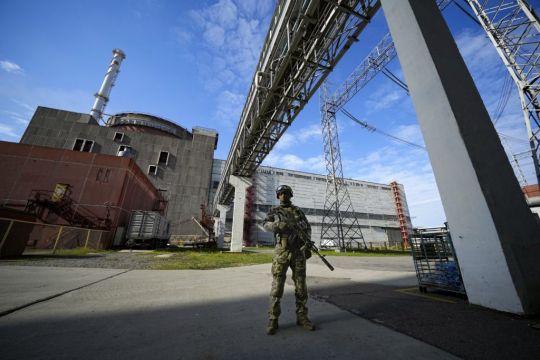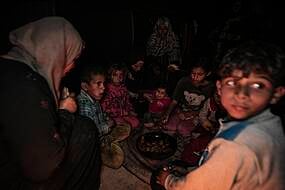The UN atomic watchdog agency urged Russia and Ukraine on Tuesday to establish a “nuclear safety and security protection zone” around the Zaporizhzhia power plant, amid mounting fears the fighting could trigger a catastrophe in a country still haunted by the Chernobyl disaster.
In a report following a visit by an inspection team last week, the International Atomic Energy Agency said “shelling on site and in its vicinity should be stopped immediately to avoid any further damage to the plant and associated facilities, for the safety of the operating staff and to maintain the physical integrity to support safe and secure operation.
“This requires agreement by all relevant parties to the establishment of a nuclear safety and security protection zone” around the plant.
IAEA director-general Rafael Grossi, who led the inspection visit, was due to brief the UN Security Council later.
Shelling continued around Europe’s largest nuclear plant on Tuesday, a day after it was again knocked off Ukraine’s electrical grid and put in the precarious position of relying on its own power to run its safety systems.
🚨 New IAEA report on the nuclear safety, security and safeguards situation in #Ukraine.
Includes findings from our ongoing Support and Assistance Mission to #Zaporizhzhya Nuclear Power Plant.
📑 https://t.co/Qy45ajMcxE pic.twitter.com/BnrxBscYSS— IAEA - International Atomic Energy Agency (@iaeaorg) September 6, 2022
Russian-installed officials accused Ukrainian forces of shelling Enerhodar, the city where the plant is situated, while the Ukrainians said Kremlin forces attacked the city of Nikopol, across the Dnieper River from the power station.
The Ukrainian mayor of Enerhodar, Dmytro Orlov, reported a powerful blast in the city around midday.
The explosion left the city of 53,000 cut off from its power and water supplies.
World leaders have called for the demilitarisation of the plant, which has been occupied by Russian forces since the early days of the war but is being run by Ukrainian engineers.
In its report, the IAEA noted that on several occasions, the plant lost, fully or in part, its off-site power supply because of military activity in the area.
The plant normally relies on outside power to run critical cooling systems for its reactors and spent fuel. A loss of those cooling systems could lead to a nuclear meltdown.
Last week, IAEA's Support and Assistance Mission to #Zaporizhzhya (ISAMZ)—led by @RafaelMGrossi—traveled to #Ukraine's Zaporizhzhya Nuclear Power Plant, where it set up a continuous presence. Here's a video overview. https://t.co/kKcnHaT2si
Advertisement— IAEA - International Atomic Energy Agency (@iaeaorg) September 6, 2022
The UN agency said a backup power supply line should be re-established and asked that “all military activities that may affect the power supply systems end”.
In addition, the IAEA warned that the Ukrainian staff operating the plant under Russian military occupation are “under constant high stress and pressure, especially with the limited staff available” – a situation that could “lead to increased human error with implications for nuclear safety”.
The IAEA also said the staff are s not being given unrestricted access to some parts of the plant and must get permission from the Russian occupying forces to reach the cooling ponds where spent fuel is kept.
Mr Grossi expressed concern that that could hamper the staff’s response in an emergency.
The report said the team saw Russian military personnel, vehicles and equipment at various locations, including several military vehicles on the floor of two turbine halls.
It called for “the removal of vehicles from areas that could interfere with the operation of safety and security systems and equipment”.

Two inspectors from the IAEA mission remained at the plant, a decision welcomed by Ukrainian presidential adviser Mykhailo Podolyak.
On Monday, the IAEA said Ukrainian authorities reported that the plant’s last transmission line linking it to the nation’s power grid was disconnected to allow workers to put out a fire caused by shelling.
Ukrainian energy minister Herman Halushchenko told Ukrainian television: “Any repairs are impossible at this point – there are ongoing hostilities around the plant.”
In the meantime, the plant’s only remaining operational reactor will “generate the power the plant needs for its safety and other functions,” the IAEA said.
Ukraine in 1986 was the site of the world’s worst nuclear accident, the explosion at Chernobyl.
Ukrainian intelligence reported that residents of Enerhodar were fleeing the city out of fear.







